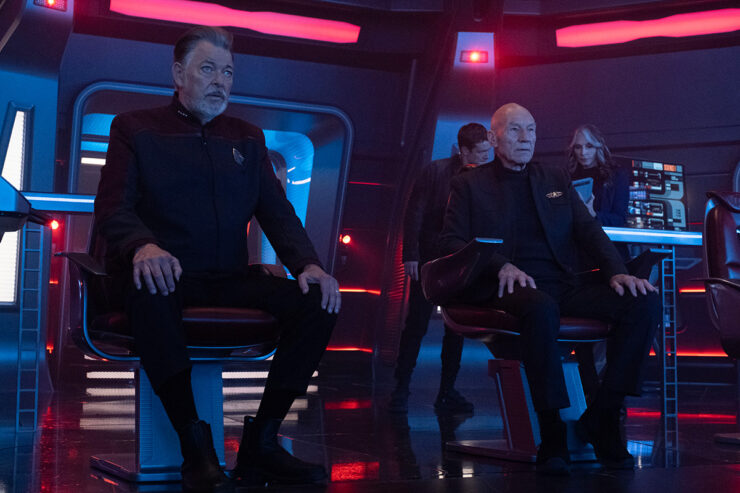When I saw the title of this week’s Picard, I was apprehensive. The show has spent its first three episodes doing callbacks to the Star Trek movies in general and The Wrath of Khan in particular, so I was dreading sitting through an hour of Kobayashi Maru references. We’ve already gotten that in Discovery and Prodigy within the last sixteen months…
So I was relieved to get to the end of “No Win Scenario” with nary a Kobayashi Maru reference. That particular deadly test—seen, not just in TWOK, but also in the 2009 movie and numerous works of tie-in fiction—has been beaten to death.
Instead, the no win scenario from the past that’s referenced is one that is new to the viewers: the time Jean-Luc Picard and his best friend Jack Crusher were serving on the Stargazer, and they “borrowed” a shuttle in order to keep an assignation with a couple of hot chicks on Argelius (from the original series’ “Wolf in the Fold”). Unfortunately, the shuttle was struck by micrometeors and was left dead in space, barely able to navigate. It took ten hours to limp back to the Stargazer.
Actually, what Picard says is, “Ten fucking hours.” This will likely result in some tiresome fulminating from people about how much the Paramount+ shows don’t understand Star Trek, because in my day, the Trek characters didn’t curse like sailors, dadgummit! Of course, the reason why isn’t because Trek is this pure thing, it’s because they weren’t allowed to on commercial television (or in G-rated movies, as The Motion Picture was). I’ll repeat what I said in the comments of my review of Discovery’s “Choose Your Pain” in 2017: the use of “hell” in the original series’ “The City on the Edge of Forever” was significantly more edgy and envelope-pushing and risky and controversial in 1967 than the use of “fuck” is on a streaming service five decades later. Trek has always pushed the limits of what’s allowed and also embraced what really is allowed, and on a streaming service in the 2020s, there are very few restrictions on language.
Another complaint that has been particularly made about this season of Picard is that some of the TNG folks who are reunion-ing this season are acting wildly out of character. The accusation has especially been leveled against Captain William T. Riker, and I want to address that, especially since a big part of “No Win Scenario” involves him.
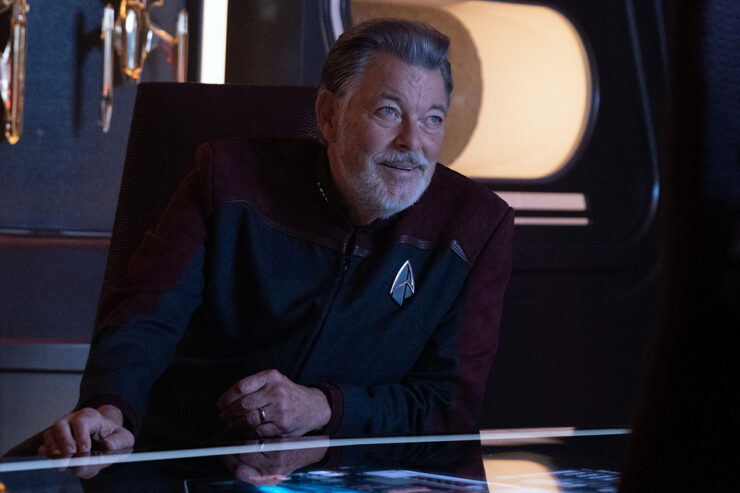
First of all, it’s been more than two decades of story time since we’ve seen most of these folks (in the movie Nemesis). In Riker’s case, we’ve gotten glimpses, at least—on Lower Decks shortly after Nemesis, and on Picard in season one shortly before the “present” of season three—but they’ve only been brief appearances.
And here’s the thing: in the twenty-odd years since Nemesis, Riker has been a ship captain, a husband, a father twice over, the grieving parent of one of those children who died, and a captain on bereavement leave. He was precisely none of those things in the fifteen years we followed him on TNG and its four followup films.
Of course he’s gonna be different. In particular, he’s greatly affected by the death of his son, who was taken from him way too young.
So when Picard and the Crushers (the name of my next band) come to him with a batshit crazy plan to get out of the nebula, Riker rejects it initially. It takes a certain amount of bullying to get him to agree to it. Mostly by both Picard and Crusher reminding him that the three of them (along with the rest of the Enterprise crew) spent years making batshit crazy plans work, and if they’re going to die, they should go out doing that instead of waiting for the ship to lose power and them all to suffocate. Riker’s counterargument is that at least the latter notion will leave something left to be found later (as he says that, he glances at the message to his wife that he’s barely begun to record).
My own argument would’ve been that the batshit plan had at least a chance of success. Sitting around waiting to die has no chance of success. And Riker finally goes along with it, even figuring out how to technobabble their way through the plan.
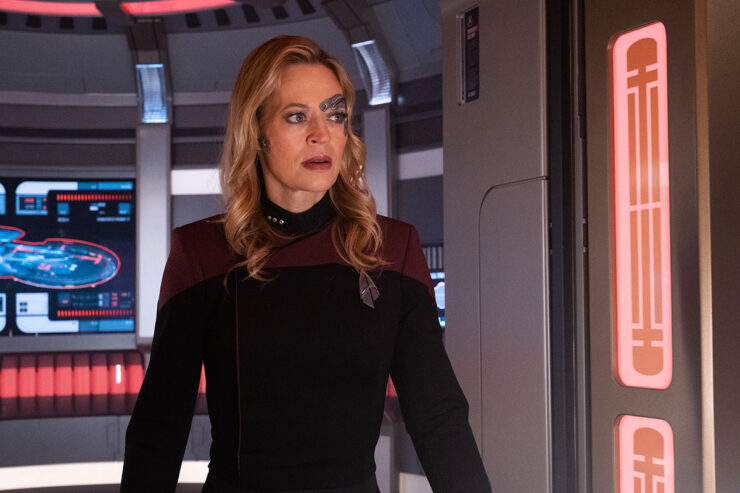
We get some other glimpses of Riker’s command style here, including his assigning Seven to seek out the changeling on board, but not officially reinstating her as first officer. The changeling is in as much danger as the rest of them, and the rest of the crew is too busy holding the ship together with both hands. Best for Seven to work more or less in secret. In addition, when they confront the Shrike toward the end of the episode (the batshit crazy plan having worked, because of course it did), he uses a tractor beam to fling an asteroid at Vadic’s ship, which cripples it. It’s a nifty bit of improvising, and one that tracks with some of Riker’s other clever plans over the course of TNG (I’m thinking “Peak Performance,” “The Best of Both Worlds, Part II,” “The Hunted,” and “A Matter of Honor” in particular).
The batshit crazy plan, by the by, is nifty on two different levels. For one thing, it’s Crusher who’s responsible for its genesis, because the writers finally remembered that she’s a doctor, not just a mother. She figures out that the nebula is, in fact, a creche for a lifeform that lives in space. Picard specifically cites the creatures from “Encounter at Farpoint” as an example of a similar type of lifeform, and the aliens that are born when the nebula “gives birth” look very similar to those aliens. (Regular commenter Christopher L. Bennett coined the term “cosmozoan” to refer to such lifeforms, which also applies to things like the giant amoeba from “The Immunity Syndrome,” the crystal entity from “Datalore” and “Silicon Avatar,” and Gomtuu from “Tin Man.”)
That moment of birth is the other nifty aspect of the plan, because we—as Crusher comes out and says—get the seeking out of new life. Which is, after all, supposed to be the point.
As the power is draining from Titan, Picard takes Jack to the holodeck, re-creating the Ten-Forward bar (they really want to amortize the cost of that set—we also have a flashback to five years earlier, with some young officers fangoobering Picard on Frontier Day while he’s at Ten-Forward trying to have lunch, about which more in a bit). They tell each other stories to learn about each other. Jack finds the exercise to be pointless, but Picard isn’t doing it for him, he’s doing it for himself. (Jack also isn’t “a wine guy,” turning down his father’s offer of some Château Picard, instead going for whiskey, preferably cheap and on the rocks. Because we have to make sure all the rakish rogue cliché boxes are checked, dammit…)
Jack is also understandably confused as to how the holodeck can still be powered, and Picard proceeds to provide an explanation for one of the stupidest things the franchise ever did. Way back in 1995, Voyager’s second episode established that holodeck power isn’t compatible with regular ship’s power, which was a cheap writer’s trick to justify doing holodeck stories on a show about a ship stranded very far from home that has power consumption concerns. Twenty-eight years later, this episode’s script by show-runner Terry Matalas and co-executive producer Sean Tretta finally provides a justification for this stupidity: to allow the crew to be able to have an escape even if the ship is in dire straits. Indeed, several members of the crew join Picard and Jack in the bar—including Shaw.
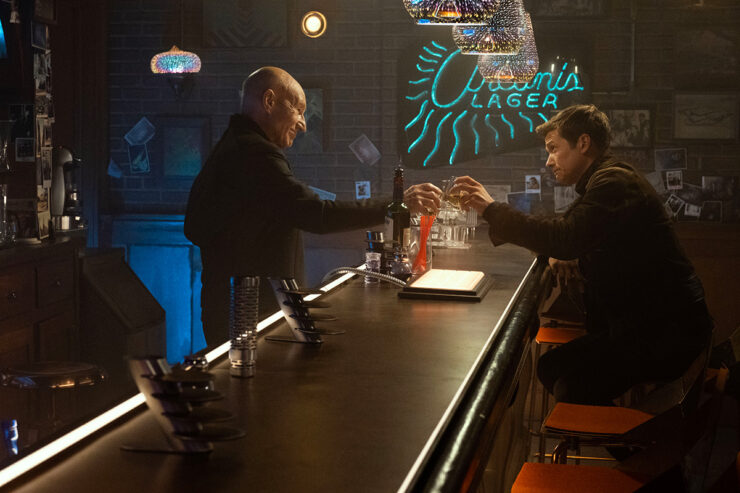
Several folks have speculated that Shaw’s background includes being a survivor of Wolf 359, or some other Borg attack, by way of explaining his animus toward both Picard and Seven. Those folks were completely right, as Shaw—in a bravura performance by Todd Stashwick, who sells every micron of the pain, fear, and anger that Shaw felt at the time and still feels more than three decades later—tells his experience of Wolf 359. Shaw was just a junior engineer at the time, and he was one of the few from his ship who survived, picked seemingly at random by a lieutenant who had limited seats to assign on an escape pod. He was just a grease monkey, a dipshit from Chicago, why did he get to live? That survivor’s guilt has continued to haunt him, and is a big reason why he’s such a dick.
His story is both very similar to and completely different from that of Benjamin Sisko, as seen in the opening of “Emissary,” but what’s especially interesting is the differences in Picard’s reactions. When Sisko confronted him about Wolf 359 in the DS9 pilot, Picard recoiled as if he’d been slapped, and the tension between him and Sisko was ratcheted up to eleven. They were both also, at that point, only a couple of years removed from the experience. Now, though, Picard has had more than three decades to come to terms with it—particularly after his experiences with Seven and Hugh and the dead Borg Cube in season one. He lets Shaw rant and rave and refuses Jack’s attempt to defend him. It’s a very mature response.
And it puts Shaw’s entire character into focus. After Picard leaves the holodeck, Shaw, by way of apologizing to the members of his crew present, says that over the years, “asshole” became a substitute for charm. It also raises several questions, the big one being, why does a survivor of Wolf 359 have an ex-Borg for a first officer?
That question isn’t answered, though Seven’s questions about changelings are answered by Shaw, since Seven was on Voyager in the Delta Quadrant during the Dominion War. Shaw explains about changelings to Seven (and the viewer), and he suggests using the infiltrator’s bucket to scan for residue that the ship can scan. He hands Seven a padd at one point, which has an image of a bucket that looks a lot like the one Odo used on Deep Space 9—and, in a lovely touch, there’s a picture of Odo on the padd’s display as well.
Unfortunately, the changeling is able to kill one crewmember and vaporize the bucket before Seven can perform that scan.
And then the batshit crazy plan kicks in. Picard goes to Shaw, saying that they need an old grease monkey, even if he is a dipshit from Chicago. Shaw is the only one qualified to hot-wire the nacelles to absorb the energy of the cosmozoans’ birth to re-power the ship and get the hell out of the nebula. Seven helps him out, and she also asks Riker to not send any additional assistance.
So when help shows up, in the form of Ensign Sidney La Forge, Seven is suspicious. Those suspicions are confirmed when Sidney refers to her as “Commander Hansen.” As established last week, she calls the first officer “Commander Seven” out of respect, which Seven points out rather tartly to Shaw.
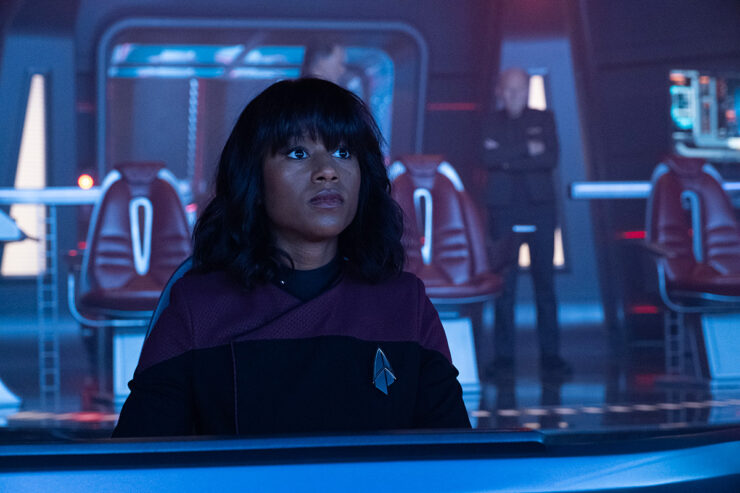
The changeling dispatched by Seven’s phaser fire, Shaw finishes the job, Titan escapes the nebula, and lots of baby aliens are born.
And the Shrike is waiting for them in the nebula, Vadic having been given instructions by her superior to go after Titan despite the risk to her ship. (And she has to dump the portal weapon, because taking it deep into the nebula will cause it to explode.) What’s interesting here is the discovery that Vadic’s entire twirling-mustache act is just that: an act. When she communicates with her boss—which she accomplishes by slicing her wrist, which causes a big giant head that speaks in a spooky voice to appear seemingly from her blood—she’s timid and frightened and deferential. Amanda Plummer modulates beautifully into that mode, before putting her face back on, as it were.
While this is a strong episode, and a fun episode, and a revealing episode, it’s not quite perfect. I love all the references, to “The Best of Both Worlds” two-parter and “Emissary” and to Argelius and to Odo and his bucket and to “Encounter at Farpoint.” But while the episode shows a good sense of Trek’s older history, it doesn’t so good with recent history.
In both this episode and the last, Riker goes on about how his grief over Thad’s death has hollowed him out and caused him to take time away from Troi and Kestra. Except we saw him in “Nepenthe,” which was long after Thad’s death, and there was no sign of any of that. So when did this develop, and why is it happening now? I’m not saying it’s impossible, mind—the grieving mind works in weird ways—but some explanation of the timing would’ve been useful and less head-scratching.
And then we have the “five years ago” flashbacks that are peppered throughout. We get more references there, to adventures both known (“Darmok”) and unknown (a meeting Picard and Worf, presumably on the Enterprise, had with an alpha Hirogen). Picard is in Ten-Forward having lunch, and some young officers start peppering him with questions. As he’s finishing up, a young man in a ballcap—whom the viewers recognize as Jack, but whom Picard doesn’t know from a hole in the wall at this stage—asks if he ever had a “real” family. Picard tartly says that “Starfleet has been the only family I’ve ever needed.”
Buy the Book
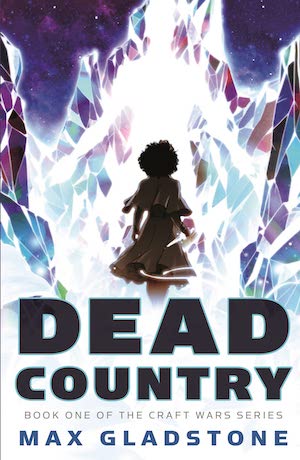

Dead Country
Except that answer makes absolutely no sense coming from Picard five years prior to this, since that would’ve been before his encounter with Dahj in “Remembrance.” Which means when he said the only family he’s ever needed was Starfleet, he (checks notes) had been out of Starfleet for fourteen years, having quit in a huff after they pulled back his Romulan rescue plan, and he’d been living in the winery that has been in his “real” family for centuries.
In addition, we get no continuation of the Worf-and-Musiker plot, which I find hugely disappointing. At least I knew that going in. The “previously on” segment included no scenes from that plot, so I didn’t expect to see Michael Dorn or Michelle Hurd at all. (This is why I always watch the “previously on” segments and never skip them, even though streaming services in particular make that easy. The scenes they choose to show you often can give you a hint of what’s coming—and, sometimes, what’s not coming. And also remind you of important stuff, like Sidney referring to Jeri Ryan’s character as “Commander Seven,” which is a major plot point.) We do, at least, see Marina Sirtis again, and while Troi is once again only seen over a viewscreen, at least she has a significant conversation with Riker after they escape the nebula.
The last scene is of Jack seeing weird visions and hearing weird voices. This also happened last week, and I neglected to mention it, mostly because it made no impression on me. It happened between when the changeling conked Jack on the head and when Seven woke him. But it’s happening again, and it’s obvious from the look on Ed Speleers’ face that this has occurred many times before.
And I remain unmoved by it. There are a lot of ways this can go, and some of them might be interesting. We shall see.
Worf and Musiker better be back next week, though…
Keith R.A. DeCandido has written several works of Star Trek fiction that featured the character of William Riker, including the novels Diplomatic Implausibility, The Brave and the Bold Book 2, Q & A, and A Time for War, a Time for Peace (that last one also showed the planning and prelude of the Riker-Troi wedding), and the comic book miniseries Perchance to Dream. Q & A is the only one of those that featured Captain Riker of the Titan, as Keith never did get to write for the Titan novel series.










